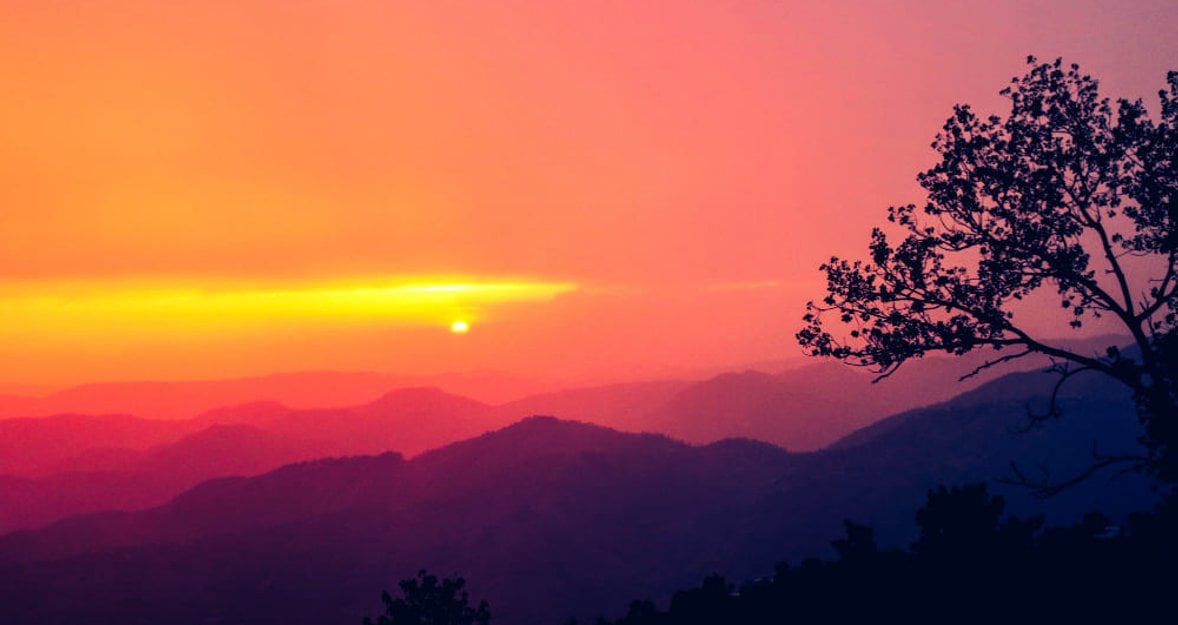Sunset Landscape Photography: Expert Techniques For Composition
August 05, 2024

This post gives you easy composition tips to take amazing sunset photos. Check it out to learn how to make your sunset pictures really stand out!
Ready to snap that killer sunset photo that stands out from the rest? Whether you're new to the camera or have been shooting for a while, this guide is going to break down the essentials of nailing nature sunset photography!
We will give you straightforward composition tips to help you capture the golden hour like a pro! At the end of our post, we'll also introduce a landscaping software for Mac and Windows that can greatly enhance your post-processing!
Let’s dive in and see how you can transform your next sunset outing into a gallery of stunning images!
Why Good Composition Matters
 Getting the composition right in sunset landscape photography is more than just making the picture look good. It's about creating images that really pull viewers in. How do you make a photo engaging? It often comes down to how you position everything in the frame.
Getting the composition right in sunset landscape photography is more than just making the picture look good. It's about creating images that really pull viewers in. How do you make a photo engaging? It often comes down to how you position everything in the frame.
A well-composed sunset photo usually feels balanced and deep, almost like you could walk right into it. Good composition also adds a dynamic touch to your photos, guiding the viewer’s eyes to focus on the key elements you want to highlight.
Let's dive into some techniques next!
Composition Techniques for Sunset Photos
How you compose the shot really matters. Here are some practical tips to help you frame better sunset photos!
1. Choose a Main Subject

A photo needs a focal point. For sunset landscapes, it could be anything distinct in the scene — a rock formation, a tree, or even a dramatic cloud formation. This gives your photo a clear point of interest.
2. Use Leading Lines
Once you’ve chosen your main subject, find lines that lead towards it. These could be roads, shorelines, or patterns in the sand. Leading lines guide the viewer's eye through the photo, making it more engaging.
3. Frame Your Subject
Using natural elements like tree branches or rock arches to frame your main subject can really make it pop. This technique helps focus attention where you want it.
4. Position the Horizon Carefully
Think about what's more impressive in your shot — the sky or the landscape. If the sky is full of beautiful colors, drop the horizon lower to show it off. If the land has interesting features, raise the horizon.
5. Look for Symmetry
 Symmetry is pleasing to the eye. Reflections in water, a row of trees, or even a symmetrical mountain can make your photo more attractive.
Symmetry is pleasing to the eye. Reflections in water, a row of trees, or even a symmetrical mountain can make your photo more attractive.
6. Experiment with a Telephoto Lens
While wide-angle lenses capture expansive views, a telephoto lens can spotlight distant details, like a distant hill lit by the sunset, adding depth to your photo.
7. Isolate Elements
Sometimes, less is more. A single tree or a small figure in a large landscape can create a powerful, focused image that tells a story all on its own.
How to Photograph Landscapes at Sunset
Learn more8. Capture Smaller Scenes
Not all landscape shots need to be wide. Close-ups of leaves, rocks, or streams can also beautifully capture the essence of a place.
9. Use the Rule of Thirds
 Imagine your frame divided into nine equal parts by two horizontal and two vertical lines. Placing your main subject at one of the intersections can make the composition more dynamic.
Imagine your frame divided into nine equal parts by two horizontal and two vertical lines. Placing your main subject at one of the intersections can make the composition more dynamic.
10. Portray Scale
When photographing expansive features like mountains or vast landscapes, include a reference point for scale, such as a tree, a person, or a building. This helps convey the true enormity of the scene.
11. Use Layers to Simplify the Scene
Look for opportunities to create a layered composition, which can make a scene easier to digest and more aesthetically pleasing. Aim to include a distinct foreground, midground, and background or compress layers using a telephoto lens for a striking effect.
12. Incorporate Diagonal Lines
 Diagonal lines add dynamism and guide the viewer’s eye through the image. Find natural diagonals like paths, tree lines, or even cloud formations that lead toward your main subject.
Diagonal lines add dynamism and guide the viewer’s eye through the image. Find natural diagonals like paths, tree lines, or even cloud formations that lead toward your main subject.
13. Use Geometry for Stability and Flow
Integrate geometric shapes, particularly triangles, which combine stability and movement within your compositions. Look for natural occurrences of these shapes in the landscape, or subtly construct them through your framing.
These straightforward techniques can elevate your sunset photos, helping you capture not just a moment but a mood!
Most Beautiful Landscape photos
Learn moreBest Camera Settings for Sunsets
 Getting that perfect sunset shot involves fine-tuning your camera to match the rapidly changing light. Let’s learn how to dial in your settings for sunset photography!
Getting that perfect sunset shot involves fine-tuning your camera to match the rapidly changing light. Let’s learn how to dial in your settings for sunset photography!
ISO Settings: Kick off with an ISO somewhere between 200 and 800. This strikes a balance, letting in enough light without compromising too much on grain. Stick with lower ISOs if you can, to keep your images crisp, but don't hesitate to increase it slightly as daylight wanes.
Aperture Settings: For a detailed image where both the foreground and the background are in focus, set your aperture to a high value like f/11 or f/16. These settings are ideal for broad landscape shots. If you want to draw attention to a specific element by blurring the background, lower your aperture to around f/4.
Shutter Speed: Adjust your shutter speed to work with your chosen ISO and aperture. Aim for a meter reading of "0" on your camera to ensure your exposure is on point. If you're in aperture priority mode, your camera will automatically select the shutter speed for you. For slower speeds, below 1/50 of a second, it's wise to use a tripod to keep your photo sharp and avoid blur from any hand movement.
White Balance: The auto setting might leave your sunset looking a bit too cool or blue. To bring out the rich golden tones of the sunset, tweak your white balance. Settings like "cloudy" or "shade" can warm up the colors nicely.
Using Filters: To tackle the high dynamic range in sunset photography, use a graduated ND filter. It helps balance the exposure between a bright sky and a darker ground. A polarizing filter is also great for enhancing colors and cutting down on glare.
Advanced yet easy-to-use photo editor
Get Luminar Neo Now
Extra Tips for Shooting Sunsets
 When you capture sunsets, it's easy to focus solely on the vibrant horizon. However, to truly convey the splendor you're witnessing, it's crucial to include elements that add scale, depth, and originality to your shots!
When you capture sunsets, it's easy to focus solely on the vibrant horizon. However, to truly convey the splendor you're witnessing, it's crucial to include elements that add scale, depth, and originality to your shots!
1. Look Beyond the Sun
A sunset doesn't always have to feature the sun itself. Observe how the sunset light colors the surroundings — maybe it casts a golden glow on a valley or pink hues on mountain peaks. Capturing these effects can sometimes make for even more compelling images than the sunset alone.
If you missed the golden hour, don't worry — you can still get that warm, golden glow with Luminar Neo! Just use the golden hour photo edit feature, which lets you add the filter with a quick slide!
2. Keep Shooting
Sunsets change rapidly, so keep your camera ready as colors could intensify, or an unexpected cloud might create beautiful rays. Experiment with different compositions and exposures during this changing light to capture the peak moments of beauty.
3. Use a Tripod
A tripod isn't just for stability — it helps you thoughtfully compose your shot. With a tripod, you can fine-tune your frame, making sure every element is perfectly placed and that there are no distractions. It forces you to slow down and really see the scene, often leading to better-composed images.
4. Work the Scene
Don’t settle for your first shot. Spend time exploring different angles and compositions. Try walking around with your camera to see how different positions change the relationship between foreground and background elements. This might reveal better framing opportunities or more interesting perspectives.
5. Consider Colors
Colors are a powerful compositional tool in sunset photography. Look for complementary colors in the scene, like reds against greens or blues with oranges, to create vibrant contrasts. Also, consider analogous colors for a more harmonious feel. Remember, you can enhance these in post-processing, but getting them right in-camera is always best.
6. Break the Rules
Sometimes, the best sunset photo breaks conventional composition rules. Placing the horizon in the center or the main subject off the traditional thirds lines can result in a more striking image. Don't be afraid to experiment.
7. Convey Emotions
Think about the mood of your scene. Is the sunset calm and serene or dramatic and vibrant? Use your composition, the quality of light, and the colors to enhance and convey these emotions. Each choice in your camera settings and framing should align with the feeling you want to communicate.
Now, you can elevate your sunset photography from simple snapshots to deeply engaging, emotive landscapes that resonate with viewers and more accurately reflect the beauty of the scenes you are capturing!
A Bit of Editing
 Polishing your sunset photos is an important step after you take them! It is simple with Luminar Neo, an auto-editing software!
Polishing your sunset photos is an important step after you take them! It is simple with Luminar Neo, an auto-editing software!
Ideal for photographers looking to elevate their landscape shots, this software enhances your images with a suite of intuitive AI tools. Luminar Neo automatically adjusts brightness and color, fine-tunes skies, and introduces realistic atmospheric effects, ensuring your sunset photos are as breathtaking in print as they are in person.
With its seamless integration and user-friendly interface, Luminar Neo makes post-processing a breeze, helping you achieve professional results quickly!
Conclusion
With the techniques and tips discussed, you're well-equipped to take your sunset landscape photography to the next level. Remember, great composition and the right camera settings make all the difference in turning a good shot into a spectacular one!
Keep experimenting and refining your approach to capture not just images but the essence and mood of those magical golden hour moments!





